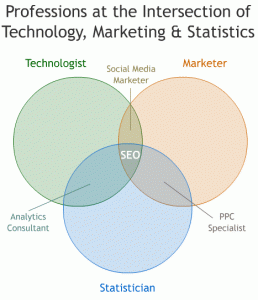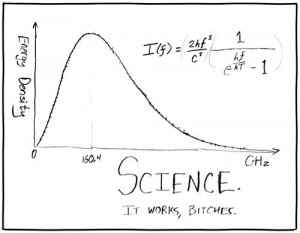SEO Is Not Science
SEO Isn’t science. It’s not rocket surgery either, but it’s definitely not science.
I’m not sure if having a computer science degree makes me a scientist or not, but I do know how to spot science. See, science has a definition. According to Wikipedia, that definition is: a systematic enterprise of gathering knowledge about the world and organizing and condensing that knowledge into testable laws and theories.
It’s that last bit that causes all sorts of problems for traditional SEO. We SEOs are pretty good at gathering and organizing knowledge. We’re even better when it comes to sharing it, but when it comes to testable laws and theories we kind of suck.
Ever since Branko’s presentation at SMX (which I liveblogged by the way ) I’ve been thinking about testing and the scientific method – and how little of it we actually do in the SEO community. It prompted me to start testing META descriptions with Alan Bleiweiss. Even though we both “knew” what the result was going to be, we did a scientific test anyway – and that’s what the SEO community needs more of.

The problem though, is that in addition to being technologists, SEOs also have to be marketers – and marketing and science don’t really have the best relationship. Marketing tends to be about making claims whereas science is more about collecting and publishing data. As SEO/Marketers we not only have to do the research, but we have to then go in front of a client and convince them why they should spend money to make changes. Often, data alone isn’t enough to sway a client.
A successful SEO is one who is able to wear a science hat and a marketing hat, but a great SEO is one who knows when to wear each one of those hats.
It’s not that SEO can’t be science, it’s just that we’re not doing a good enough job of making it a science – and that’s bad for the industry. Unverifiable claims are one of the quickest ways to get the snake oil reputation. Science is how that nasty reputation can be avoided.
Unfortunately, many SEOs (myself included) get too caught up in the lifestyle to worry about actually doing SEO. Talking about SEO, doing the conference circuit, and living the A-list twitter life are all things that come to those who make SEO claims – but sometimes we get so caught up in that life and making those claims that we forget to actually test our claims.
Sometimes, it’s our own egos that prevent what we do from being called science. “I’ve been doing this for X years, it works, I don’t need to test that, everybody knows it.” How many times have you said something like that? Read through the comments on Alan’s META description test and count the passionate opinions there that are soley based on ego without any data to support them. There’s quite a few.
The true SEO scientist doesn’t just make a claim. He gathers data, then posts that data for others to examine. The problem though, is that posts full of data don’t get retweeted and they don’t get onto the front page of Sphinn. Posts full of claims however do get lots of retweets.
It’s that community aspect of SEO that’s holding us back from achieving our true potential. I can hear a few people muttering under their breath “Oh, he’s just jealous that he’s not an A-lister” and well, that’s true, but it’s not the motivation for this post. I firmly believe that all the A-list SEO people have earned their status. They did awesome work, wrote great blog posts, and did everything else to earn the success they’re enjoying today.
Science and fandom don’t mix.
The problem with reputation though, is that people stop questioning A-listers. They’re no longer required to produce data or backup their claims. While they’ve deserved that right, it’s not good for science. A-listers and SEO rockstars can be wrong too. Nobody’s perfect. Just look at how many advocated pagerank sculpting several months after Google quietly changed how nofollow worked. (then, look at how many refused to admit they were wrong.)
Pay attention next time Danny Sullivan or Lisa Barone write a blog post. Almost instantly they’ll get 10-12 retweets. (and usually, they deserve them too as they write awesome stuff.) The problem here isn’t the retweets, it’s the amount of people who retweet before they actually had time to read the blog post. If retweets are the social equivalent to links on web pages, then so many people are turning their twitter feeds into free-for-all directories. You wouldn’t recommend a doctor that you’ve never visited, why would you recommend a blog post that you haven’t read? What if Danny’s blog had been hacked to include a Viagra post? I bet he’d still get several blind retweets. Stuff like that doesn’t help SEO get taken seriously as a science.
sometimes in SEO it doesn’t matter what you’re saying, simply how loud you say it.
We’ve all heard that the squeaky wheel gets the grease, but in SEO it’s the loudest shouter who gets the attention. Usually, those shouting loud know their shit, but not always. It’s important for SEO that we still continue to scrutinize and think critically about what people are saying – no matter who’s saying it. Everybody makes mistakes.
When we’re dealing with over 200 inputs like in SEO, it’s very easy to mix signals, miss relationships, or confuse correlation and causation. Rather than simply making claims, we as an industry need to focus on becoming more scientific. Don’t be afraid to run tests, share your data, and discuss methodologies. You may be right, you may be wrong, but either way you’ll be starting a scientific discussion in which everyone is bound to learn something – and that will make us all better SEOs.
SEO in its current form is not science. It’s starting to be though. Several great people and companies are attempting to put the science back in SEO, and I’m excited to see where our industry can go once more people get on board.
17 comments June 24th, 2010




